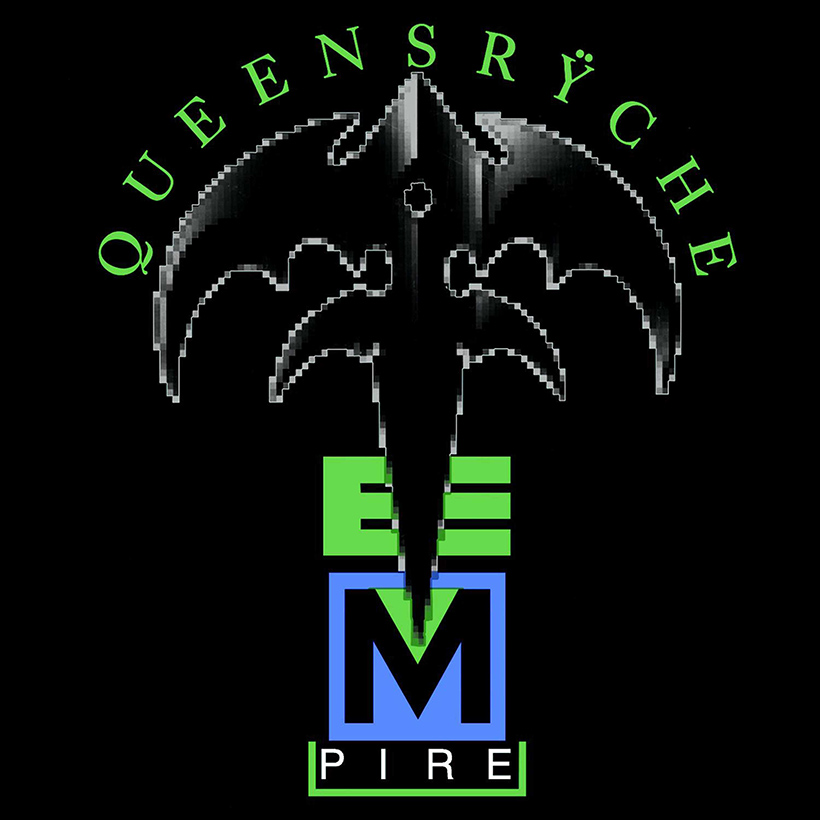When they practically spun the metal world off its axis with their 1988 prog spectacle Operation: Mindcrime, Queensrÿche shattered the misconception that they were yet another testosterone-fueled hair metal band. But as they started thinking about following up the monumental release, they decided not to record another concept album. First, they knew it would be a major challenge to match or one-up Mindcrime, and maybe more significantly, they didn’t want to condemn themselves to a future of writing rock operas.
Nonetheless, Queensrÿche’s 1990 album Empire isn’t full-on commercial rock. The record yielded several radio-ready singles, but the songs feature plenty of unconventional flourishes. “Best I Can” starts with a nightmarish wash of sound and a scream and continues with staccato keys and children’s vocals, and “The Thin Line” incorporates synth blasts that sound like foghorns and vocals treated with a reverse delay effect. There are also chuggy, riff-heavy cuts like “One and Only,” “Resistance,” and the title track, a tension-filled anthem about crime, drugs, and violence that builds to an ominous, shouted chorus and is punctuated by a spoken word mid-section that spouts law enforcement statistics over gently ringing guitars. The latter is the closest the band gets to the insurrectionary spirit of Operation: Mindcrime, yet it’s not the only social or political song on the album. “Best I Can” is about a young man who survives a shooting accident and later strives to overcome his permanent injuries and achieve his goals. “Resistance” hits on environmentalism and partisanship and the funk-inflected “Della Brown” addresses homelessness and hopelessness in equal measure.
Queensryche – Best I Can (Official Music Video)
Click to load video
But even when confronting topical issues, Queensrÿche avoid self-indulgence, favoring a more commercial sound. As a result, fans of the band’s early metal and heavy prog sound may not connect with Empire. On the whole, the record rocks about as hard as Def Leppard’s Pyromania despite abundant guitar acrobatics, courtesy of Chris DeGarmo and Michael Wilton.
Since they weren’t going for the jugular, Queensrÿche tugged at the heartstrings. About half the songs are about relationships, but not of the typical, lust-driven metal ballad variety. On “Jet City Woman,” vocalist Geoff Tate laments being on the road thousands of miles away from his girl. And in “Another Rainy Night” he takes a mature, poetic approach to love lost: “Strange how laughter looks like crying with no sound/Raindrops taste like tears without the pain.”
The song on Empire that rocketed Queensrÿche to mainstream success was the acoustic-driven, Pink Floyd-inspired “Silent Lucidity,” the closest the band came to embracing spiritual/psychedelic culture. Amidst a sea of delicate, plucked guitars, swelling keyboards, lamenting strings, aaaaah-aaaaah background vocals, and a lead redolent of David Gilmour, Tate sings in a clear tenor voice about lucid dreaming: “If you open your mind for me you won’t rely on open eyes to see/The walls you built within come tumbling down and a new world will begin.”
Queensrÿche – Silent Lucidity (Official Music Video)
Click to load video
One way to view Queensrÿche’s Empire is as a struggle between the desire for stardom and the need to retain artistic credibility. That duality is palpable throughout, exemplified by the mix of mainstream songwriting and offbeat touches as well as the combination of love songs and political diatribes. Due to their generally serious approach to music, some have viewed Queensrÿche as sad sacks burdened by the weight of the world and afraid to smile. Yet they exhibit a sense of humor in the strange answering machine message that precedes “Empire”: “Sorry, I’m just…,” the caller says in a disoriented voice. “It’s starting to hit me like a two-ton heavy thing.”
More revealing, the relationship songs on Empire express the notion that love conquers all, and even some of the political numbers offer glimmers of hope. Though he’s crushed by a tragic shooting, the subject of “The Best I Can” is determined to “chase the light I see ahead, illuminate the path I tread.” And in “Resistance” Tate suggests approaching the great divide between the haves and have nots with determination and compromise: “There’s no easy solution/The price is high and it’s time to pay.”



